In 2016, the Makhad Trust set up a prototype course to teach orphan children how to grow and sell herbs. The course worked well and enabled a second course to begin but with a new tutor. Selim Mahana is a very experienced herbalist and is also a very good teacher. He taught a group of students from Wadi Esbaia (15 km outside the town of St Katherines) 2017 to 2019, who are now tending their herbal gardens. In Autumn 2019, Selim started teaching a new class of students from Abu Sila and St Katherines, in a garden behind Fox Camp.
Background: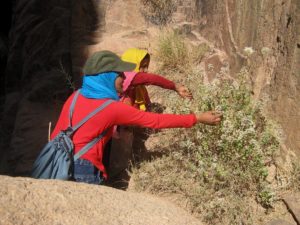
Bedouin have been using herbs for medicinal and culinary purposes for hundreds of years and there knowledge is huge. Almost all Bedouin can name a large number of common herbs and tell you what it is good for. This knowledge is part of their cultural traditions, their link to the landscape and to their communities. Many of the herbs grow high in the mountains and are not easily accessible. As patterns of life change, and working with tourist trekkers has declined, younger Bedouin are growing up without this knowledge, which is a great shame as such information is part of their cultural heritage of surviving in the this desert mountain area. It is also a problem in an country where there is no free health care, and people don’t have the money to pay for a doctor when they are sick. The impetus for this course is to ensure this great body of herbal knowledge is passed on to the younger generation, and also to help those youngsters who have lost their fathers, by teaching them a trade they can use to support their families in the future.
How the course is run:
Selim worked on the EU funded Herbal Agriculture Project for 3 years and learnt a great deal about herbs. He wants to pass on this information to the next generation and to help young people in need, so he came forward as our teacher. He has recruited young people who have lost their father (who are consequently suffering the grief of loosing a parent, and the poverty that comes from loosing the main breadwinner of the family).
Students are between 9 and 20 years of age and Slim has split each class into 3 teams with an older student leading the younger ones. Each team will gather herbs and propagate them in the team garden. They will learn where the herbs grow, how to gather them, how to propagate them, how to harvest and prepare the herbs and to sell them. They will learn about the environment where the herbs grow and the right times for all these activities, as well as the medicinal properties. The course runs from August through to October and then again, after the winter, from March through to May each year. We hope this course will fulfil all our aims, and those of the students taking part.
We are very grateful to the de Byre Charitable Trust for funding this course.
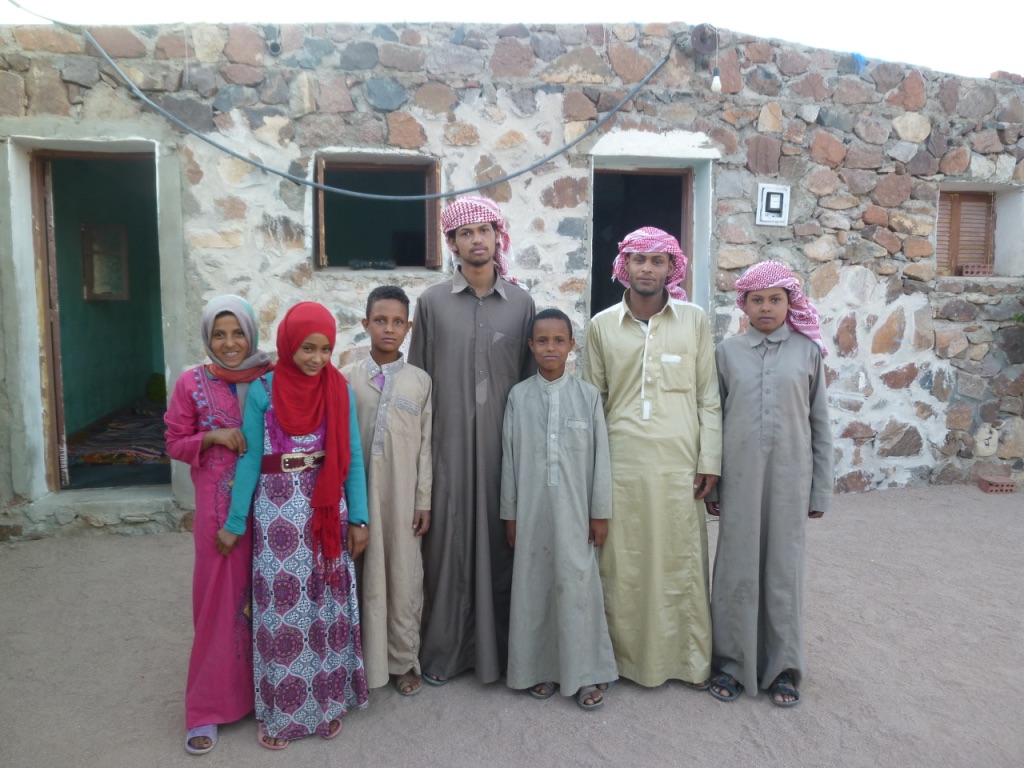
7 of the 10 students at the start of the course
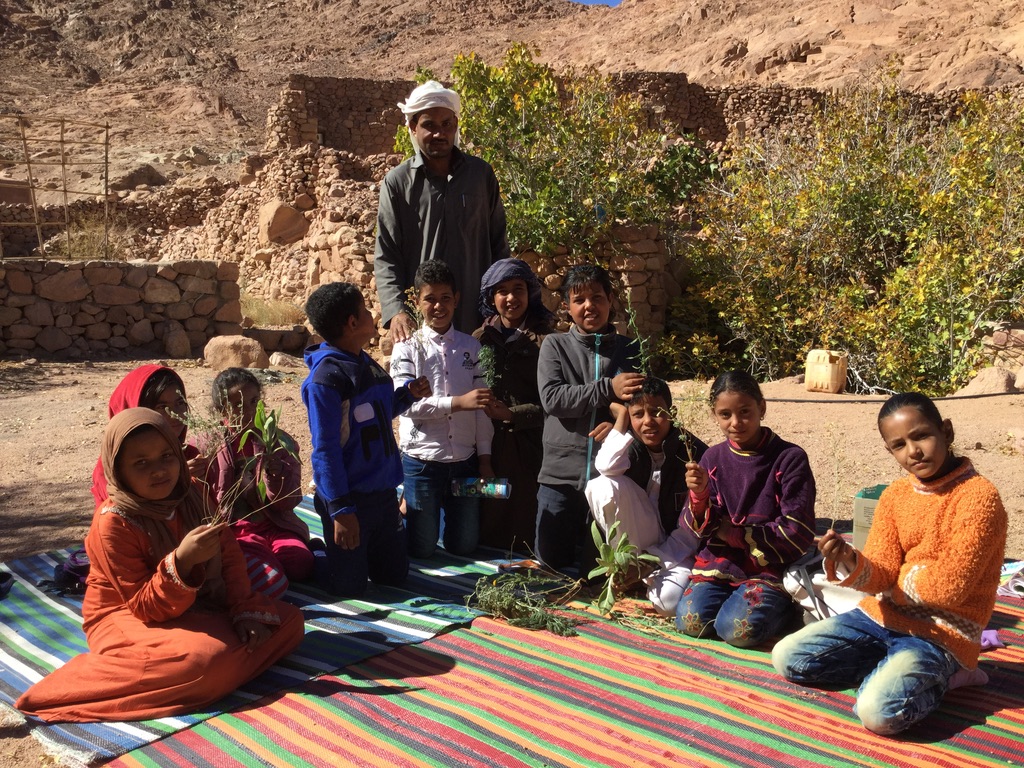
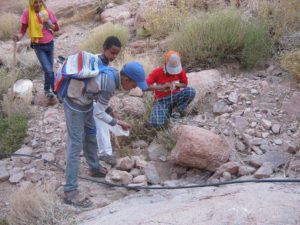
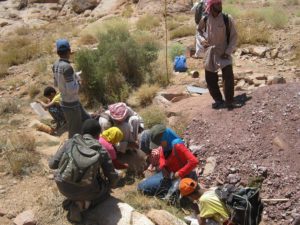
There are three methods for extracting water from wells. A large majority of them use gravity from wells above the water tanks with a siphon hose to fill the tank. Other wells are spring filled straight into a tank or pool. A third category need to have pumps which are usually fuelled by petrol. In the past, the water would have been extracted from most of these wells by using a hand operated shades or lever. However, with the growing availability of cheap, reliable petrol driven pumps, most Bedouin now use them instead for water extraction.
However, this has made well owners not only reliant on fuel for the motor, but also on a source of spare parts and mechanical expertise, to enable them to continue using their wells. Another issue with petrol driven pumps is that they are a potential source of pollution because of the fuel and oil that is used in their operation.
Furthermore, the Egyptian government has recently started to reduce the subsidy on fuel, which has resulted in the price of fuel nearly doubling over the last 12 months. The price of fuel is expected to increase even more in the near future. This, along with overall increases in costs of living, has make repairs and maintenance of the petrol driven pumps rather expensive.
Hence, to assist the Bedouin, the Makhad Trust has started a new project, where solar powered pumps are installed as replacement for the petrol driven pumps. This method allows automatic pumping of water into a water tank, but it is also sustainable, and does not produce noise or pollution.
During his last journey to Sinai in April 2015, our trustee Dick Stainer organised the installation of a prototype solar pump in Hussein’s garden, high up in the mountains. Now the pump is installed and it is pumping water out of the well automatically to the birka, even when Hussein is not there – which he thinks is magic! We intend this to be the first pump of this type but we hope to get funding for all the wells using petrol driven pumps over the next 5 years
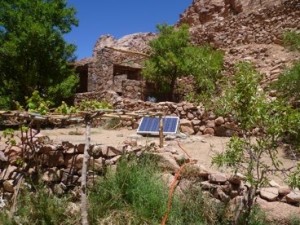
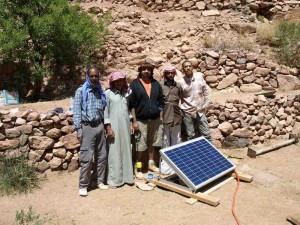
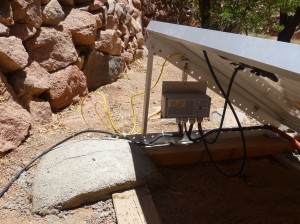
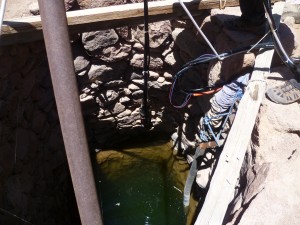
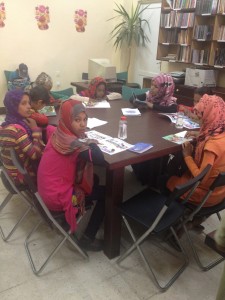
Another triumph for the Trust is the establishment of a library for women and children in St Katherine’s. On a fortuitous full moon on 4th of May 2015, the Makhad Trust opened a new library in St Katherine’s. The project was a combined venture with the Nawamis Development Society (Makhad’s sister charity based in Egypt), the American University in Cairo and the Ministry of Culture. The Mayor of St Katherine’s was also supportive and provided a large room to house the library, 1200 books were donated by the University and another 805 by the Ministry of Culture. The library will primarily be for the use of Bedouin women and children and in near future we will be providing more books specifically for them through fundraising efforts. The Library is being managed by Farhana, the first Bedouin woman to run a library there and who was fortunate in having a good education herself. Most Bedouin women are unable to read, so one of Farhana’s priorities is to set up literacy courses. She also has some great ideas for encouraging children to come and use the facilities. So far her ideas are so successful that the library has been full of children after just one week and so she is going to offer twice as many sessions as expected!
Update 10 August 2017
The library is continuing to flourish. Farhana has taken maternity leave to look after her new baby girl, called Farrah, and handed over to Zainab who will continue the good work. Mahmoud Abed, who has moved to St Katherine’s from Cairo, is now running film nights showing educational documentaries and also craft and making workshops. The glove puppets were a great success. We hope to continue expanding the activities in the library so that it draws in more children and their parents.
1 June 2022
The library has continued to operate and is slowly growing. With the reconstruction of St Katherine’s, including the Town Hall, the library will need to find a new building/home. This can be to the library’s advantage as the new room could be specially adapted for the library needs with a separate entrance for women entering the building, and separate facilities. We wait for news on this.













